REMEMBERING THE FIRST BAHÁ’Í WORLD CONGRESS
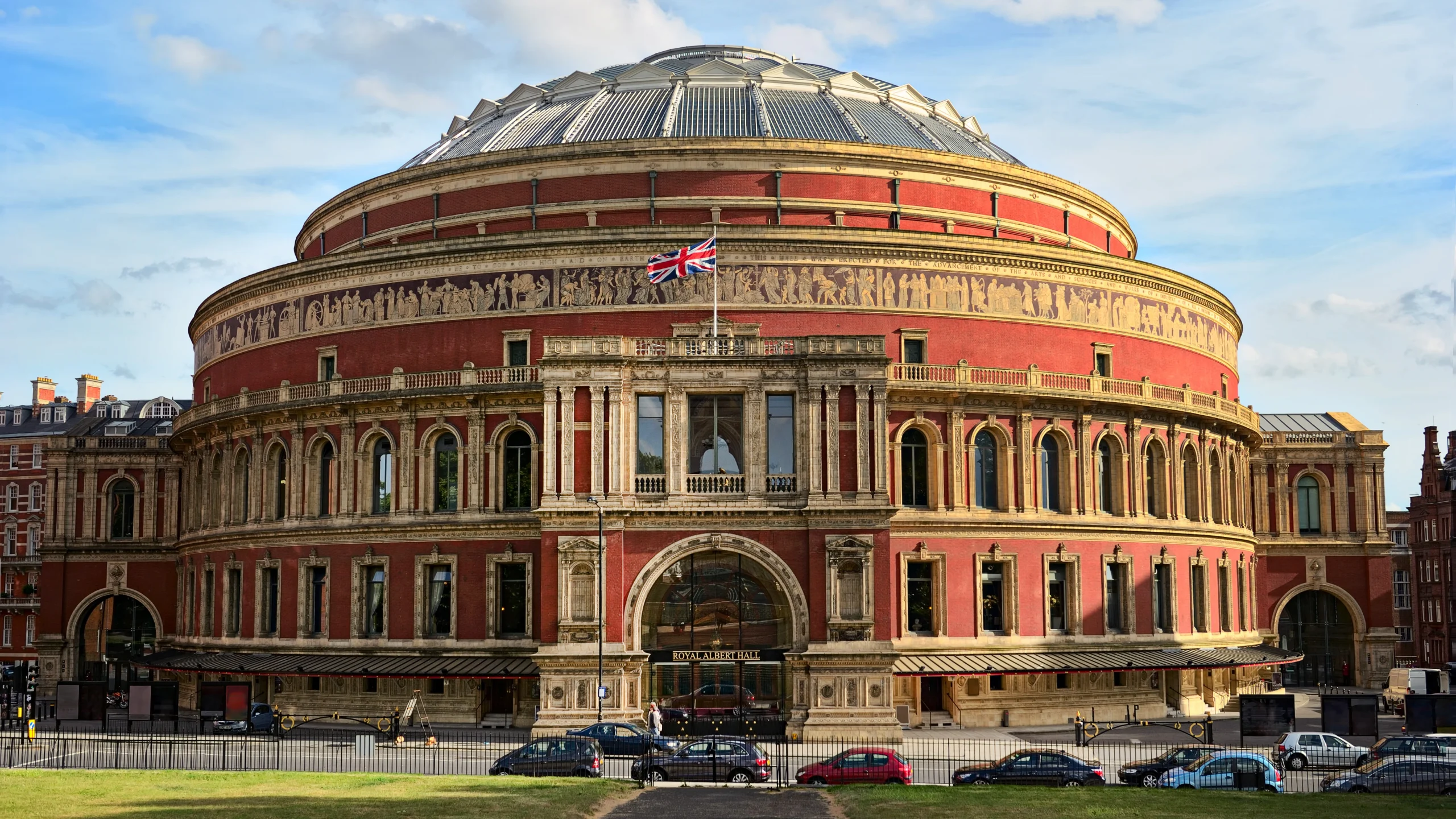
ROYAL ALBERT HALL
This story carries some first-hand recollections from some believers of the then Malaya, who participated in the First Bahá’í World Congress held in London in 1963. To them, the First Bahá’í World Congress was certainly a one-time event in their lifetime.
The beloved Guardian had wanted this long-planned gathering to take place in Baghdad, but the situation did not allow the gathering to take place there. In 1961, the Hands of the Cause of God residing at the Holy Land decided to hold the Congress in London, which would also enable the participants to visit the resting place of the Guardian. The believers who gathered there had every reason to be in a blissful mood. The Congress that has a unique and unparalleled place in our history was convened for the celebration of the completion of the Ten Year Crusade, the Centenary of the Declaration of Bahá’u’lláh and the election of the First Universal House of Justice. The First Bahá’í World Congress was often referred to as The Most Great Jubilee. This earth-shaking event was held at the Royal Albert Hall in London from 28 April to 2 May 1963, falling from the ninth to twelfth day of Ridván.
From the time the momentous Congress was planned the Arrangement Committee in London had been sending out information to the Bahá’í world. The information for the believers in the South East Asian area was disseminated through the Malayan Bahá’í Newsletter, published by the Regional Spiritual Assembly of South East Asia. As the days approached, updates were provided on matters like hotel bookings, tours, care of children, local travel, translations, and visits to the resting place of the Guardian. All were encouraged to arrive in their national costume. Mr. Tony Fernandez, Chief Traffic Officer of Malacca town and Dr. Chellie John Sundram of Penang made arrangements for a chartered flight. Tony briefed the participants on how to prepare for the trip and what to expect in London. The trip to London was to be on 14 April and the return on 6 May. The fare to London from Singapore and hotel charges amounted to Malayan Dollars $1, 530.50. An additional sum of a mere $2.50 was charged for incidental expenses. In anticipation of any disturbance from the Covenant Breakers, Mr. Kamran Samimi, a member of the Regional Spiritual Assembly of South East Asia, issued Bahá’í credential cards to the participants from this region.
Since the announcement of the Most Great Jubilee was made for months, they had all been praying, planning, applying for leave, selling some of their valuables and borrowing. This trip involved a lot of sacrifice on the part of the spouses, mainly financially. Between Inbum Chinniah and Lily, it was decided that Lily would go. Between Dr. Chellie Sundram and Shantha Sundram of Penang it was decided that Shantha would go, and in order to make her stay in London comfortable, Shantha said that they had sold a valuable carpet in their possession. And between Tony Fernandez and Betty it was decided that Tony would go. Mr. Jamshed Fozdar, Chairman of the Regional Spiritual Assembly of South East Asia and working for an American company in Saigon, had become financially very sound and paid the fare for some of the members of the Regional Spiritual Assembly who could not afford the trip, as well as for his siblings. Many of the passengers on this flight had a tight budget on this trip.
The Bahá’ís of Indonesia, the Philippines, Vietnam, Brunei, Laos, and Malaya met in Singapore on 14 April 1963. They were made up of believers from Chinese, Indian, Ceylonese, Persian, American, Filipino, and aboriginal backgrounds respectively. And the built-up excitement climaxed at the airport in Singapore where the flight originated, as the passengers started arriving there individually and in groups. The believers were excitedly holding their passports and tickets in their hands for group check-in. For some it was the first time they had taken their passports, for others it was their first flight in their life, and for others it was their maiden trip abroad, and for most of them their first trip to London. And they all boarded the BOAC Boeing at 2200 hours or 10:00 pm. The plane that took off from Singapore was on its way to Bangkok for transit before proceeding to Athens in Greece.
Those who were on board from Malaya were many. From Malacca came Mr. Tony Fernandez, Mr. Leong Tat Chee, Mr. Pijush Kanti Paul, Sathiawan Singh, Mr. Tushar Kanti-Paul, Mrs. Lily Chinniah, Miss Chiang Kim Lin, Miss Koh Ai Leen, Mr. Chin Soon Boon, Mr. Raymond Peter, Mr. Jeffree Lee, Mr. S. Bhaskaran, Mr. Leong Ho San; from Seremban – Mr. Yankee Leong, Mr. K. Rajah; from Raub came Mr. Joshi; from Penang came Mrs. Shantha Sundram; from Petaling Jaya came Dr. R. J. Wolff, Mrs. Elinor Wolff and their four children; from Sandakan came Dr. John Fozdar; from Brunei came Mr. Minoo Fozdar, Mr. Chin Yun Sang and Mr. Andam Arak; from the Philippines came Mr. Vicente Samaniego and from the jungles of Malaya came Mr. Deraoh Leman.
Mr. Deraoh Leman was the only aboriginal believer of Malaya on the jumbo jet plane. Coming from an economically difficult situation, the National Teaching Committee of the Bahá’í s of Malaya and Singapore incurred the expenses for his passport and covered expenses for his trip to the Congress in London. Deraoh was for the first time in his western suit, with everything appearing new to him. He was often poking his fingers into his ears to clear the tingling sensation caused by the pressure of the plane at high altitude. Leong Ho San was seated next to Deraoh Leman explaining everything that he needed to know on that maiden flight. Leong Ho San, as a travel teacher in the aboriginal areas with Dr. R. J. Wolff in 1962 had known Deraoh well. The seasoned travelers like Dr. R. J. Wolff and his wife Elinor and their four small children were naturally quite relaxed. Yankee Leong and Leong Tat Chee were often in a meditating mood while K. Rajah who occupied a window seat, and next to Bhaskaran was quite oblivious to his other companions and reciting prayers quietly. Lily Chinniah from Jasin was wrapped up in a blanket, cardigan, and shawl as she developed air- sickness. And Tony Fernandez on whom had fallen the burden of organizing this tour, was seen relaxed for the first time after all the stress and strenuous odds he had to go through. But all was things of the past.
As the participants were expected to be in London two weeks in advance of the Congress, some had already crafted their own plans in advance. Raymond Peter was already talking to his fellow passengers on visiting the House of Worship in Frankfurt, Germany. Some were definitely concerned if they could get the Asian food in London.
S. Bhaskaran, was in deep thoughts all the way. It was clear to him that it was going to be the biggest Bahá’í gathering and, for the first time, the Bahá’ís of the world were gathering together. Having accepted the Faith in 1959 and accustomed to Bahá’í gatherings in Malaya that did not have more than 50 believers, he was excited to witness a gathering of which magnitude he was yet to witness. To him, that was certainly going to be the biggest religious gathering in history, as never attempted by any other religious group. He reflected on what the Guardian had written about the Prophecy of Daniel (12:12) which was about to be fulfilled at the First Bahá’í World Congress in London in 1963:
“…Sometimes people strive all their lives to render outstanding service. Here is the time and opportunity to render historic services; in fact, the most unique in history, aiding in the fulfillment of Daniel’s Prophecies of the Last Day, and the 1335 days, when men are to be blessed by the Glory of the Lord, covering the entire globe—which is the real goal of the Ten-Year Crusade. …In other words, when we fulfill the Ten-Year Crusade we will have brought into fulfillment Daniel’s great prophecy of “Blessed is he who waits and comes to the 1335 days”. What could be more wonderful than taking part in the fulfillment of religious prophecy of over 3,000 years!”
As the plane landed in Bangkok, other believers boarded to the cheers of those already in the plane. The new passengers were those already known to the others on the plane. Those who boarded the plane in Bangkok were Miss Bahiya Sohaili from Laos, Mrs. Shirin Fozdar from Thailand, Mr. Jamshed Fozdar with his wife Parvati and son Vijay from Vietnam, Mr. Dempsey Morgan and his wife Adrienee Morgan from Cambodia, and some friends from Japan and the Philippines. Now the plane was full, including a contingent of some 70 believers. As the plane took off from Bangkok, all were now looking forward to the most exciting moment in their lives – the First Bahá’í World Congress.
There were the members of the Regional Spiritual Assembly on the plane who had to arrive in Tel Aviv, as delegates to elect the first Universal House of Justice, before proceeding to the Congress. Owing to the clash between the Arabs and the Jews in Israel, the plane did not go directly into Tel Aviv; instead, it landed in Athens, Greece. When the plane stopped over at Athens, members of the Regional Spiritual Assembly of South East Asia left the main group to proceed to Haifa. The others rested in the Athens airport and continued their onward journey to London.
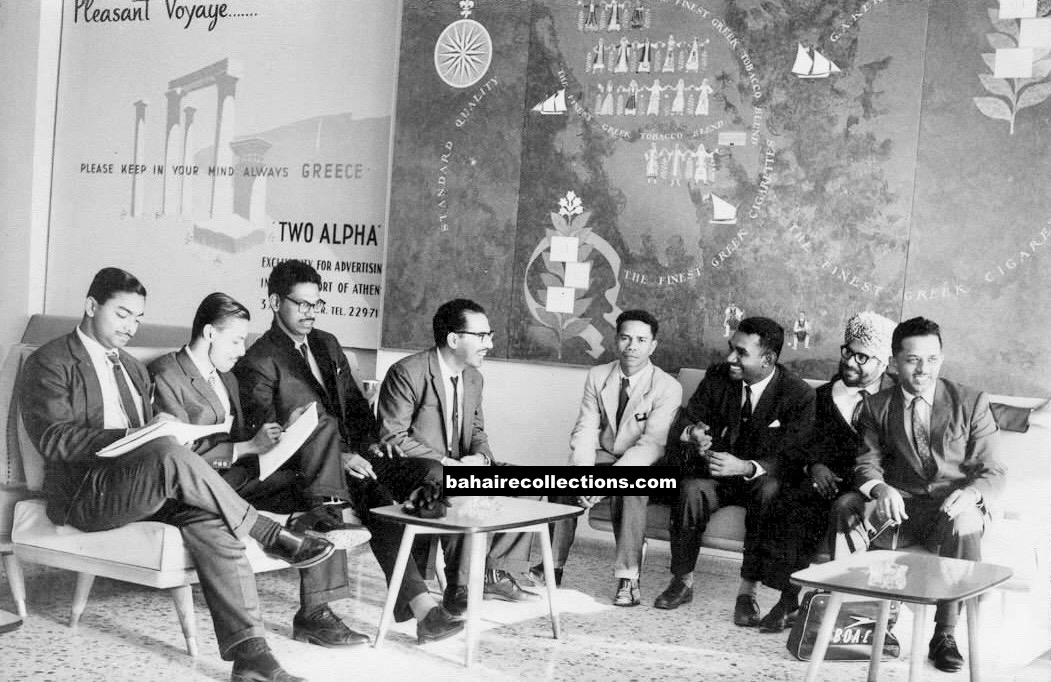
Transiting at the Athens International Airport. L-R: Tushar Kanti-Paul, Pijush Kanti Paul, S. Bhaskaran, Minoo Fozdar, Deraoh Leman, Raymond Peter, Sathiawan Singh and Tony Fernandez.
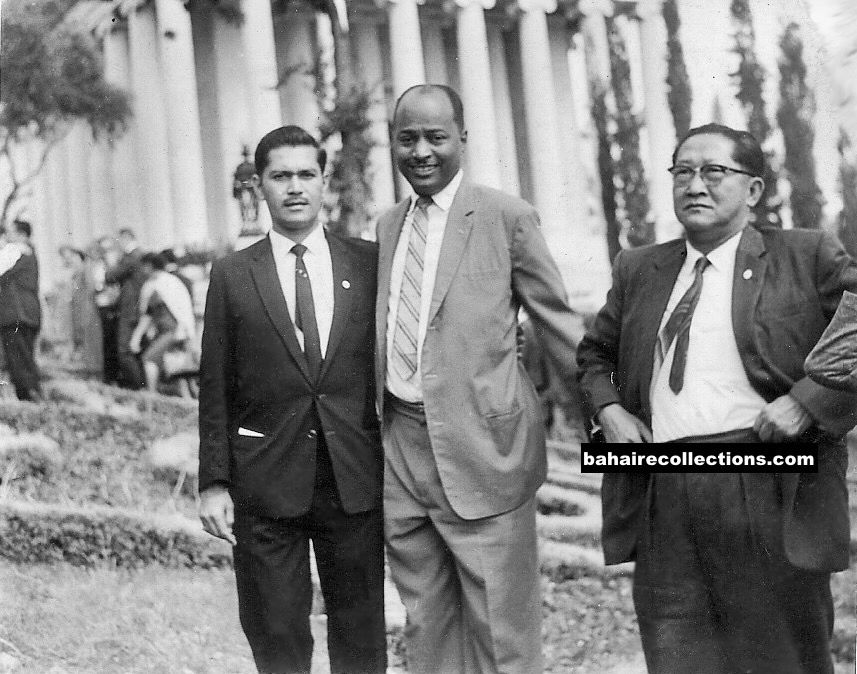
Opposite the International Bahá’í Archives building, Haifa. L-R: Jamshed Fozdar, Dempsey Morgan and Leong Tat Chee. Following the election of the first Supreme Body these three joined the others at the First Bahá’í World Congress in London.
Some Malaysians found their own way to London. Mr. Appu Raman of Alor Star, who was on a United Nations Fellowship, timed his working tour of Britain to be there on time for the Congress. Mr. and Mrs. R. Jegathesan of Penang and Mr. T. Dorairatnam of Malacca who were studying in England joined the Congress. Mrs. George Lee, the only participant from Singapore, made her own travel arrangements to arrive in London on time.
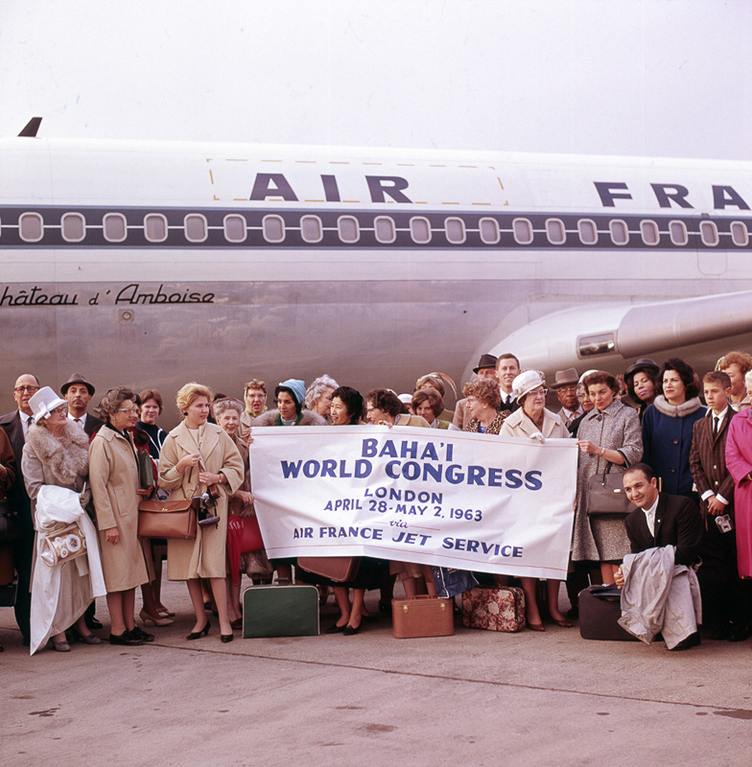
Bahá’ís of France boarding charter flight to the World Congress. Copyright © Gregory C. Dahl
IN LONDON
When they all arrived at London airport, they parted company and went their own way to meet again at the Royal Albert Hall – the venue of the Most Great Jubilee. These Bahá’ís arrived in London two weeks before the Congress. Mr. Chin Soon Boon of Malacca was in charge of arranging the continental tour for the two weeks. They were left to themselves until the time when they came together again on 28 April at 3:30 pm at the Royal Albert Hall. Most of the Bahá’ís from South East Asia were accommodated in a hotel in Leicester Square in London, close to an underground train station going to the venue of the Congress. Some were in the Paddington area while a few more were in a nearby youth hostel.
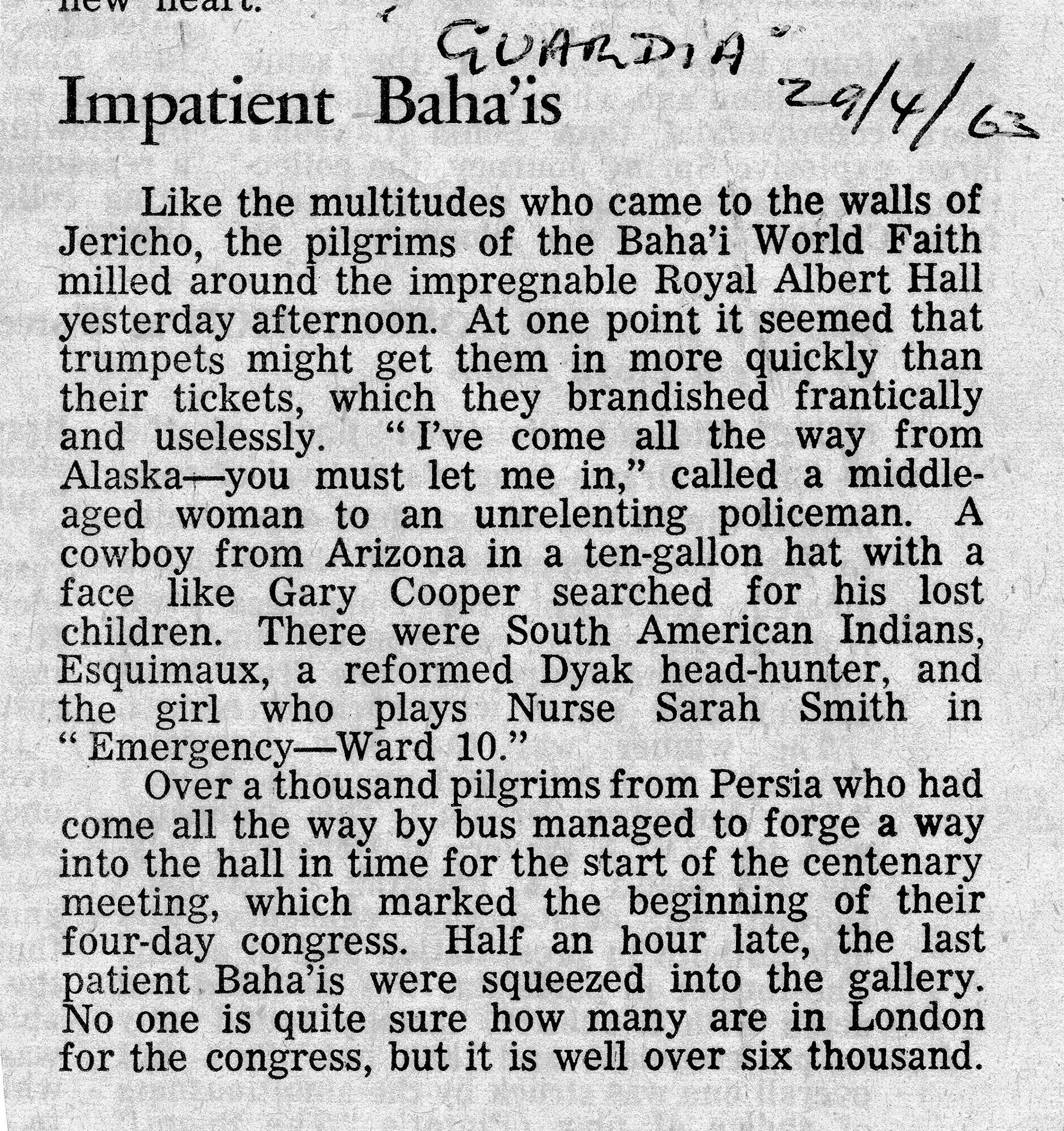
Coverage by the Guardian dated 29 April 1963.
CONGRESS STARTS
The first day of the Congress was simply electrifying. Friends from various parts of the world started to gather at the Royal Albert Hall, with shouts of Alláh-u-Abhá here and there. The Royal Albert Hall grounds looked like a garden of humanity where flowers of all colours were strewn thickly in a beautiful mass. They arrived in their national costumes. The Congress was held during spring and the weather was pretty cold for those from Malaya. The ladies of Malaya attiring in their national costumes – Shantha in Indian Saree, and Lily Chinniah and Chiang Kim Kin in “Baju Kebaya,” a garment traditionally worn by women in Southeast Asia. These three felt the cold and started shivering, but with the warmth of love generating among the believers, the shivering subsided, says Chiang Kim Lin of Malacca.
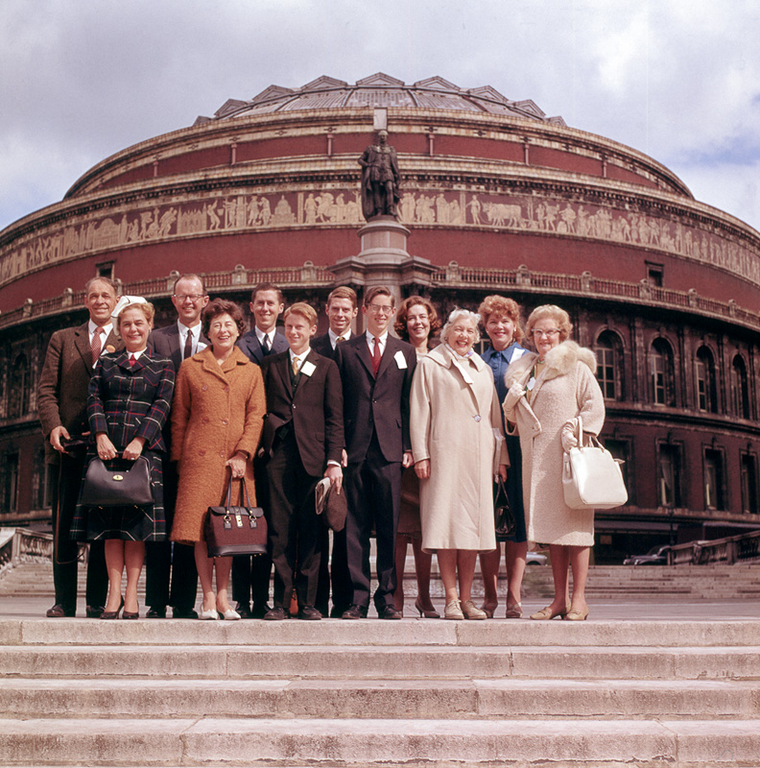
Monterey Peninsula Bahá’ís at the World Congress. Copyright © Gregory C. Dahl
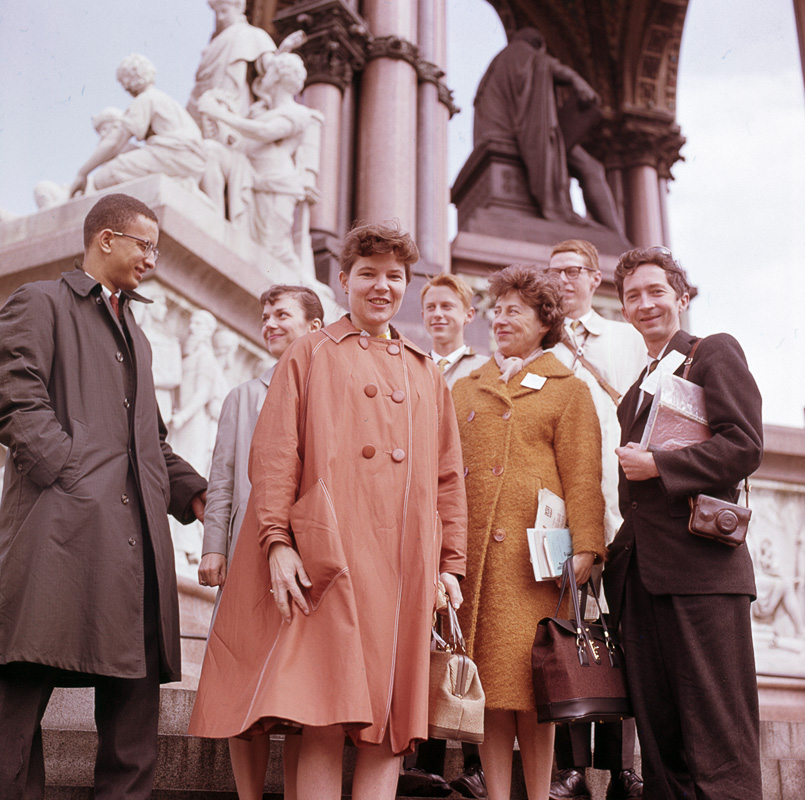
American Bahá’ís at the World Congress. Copyright © Gregory C. Dahl
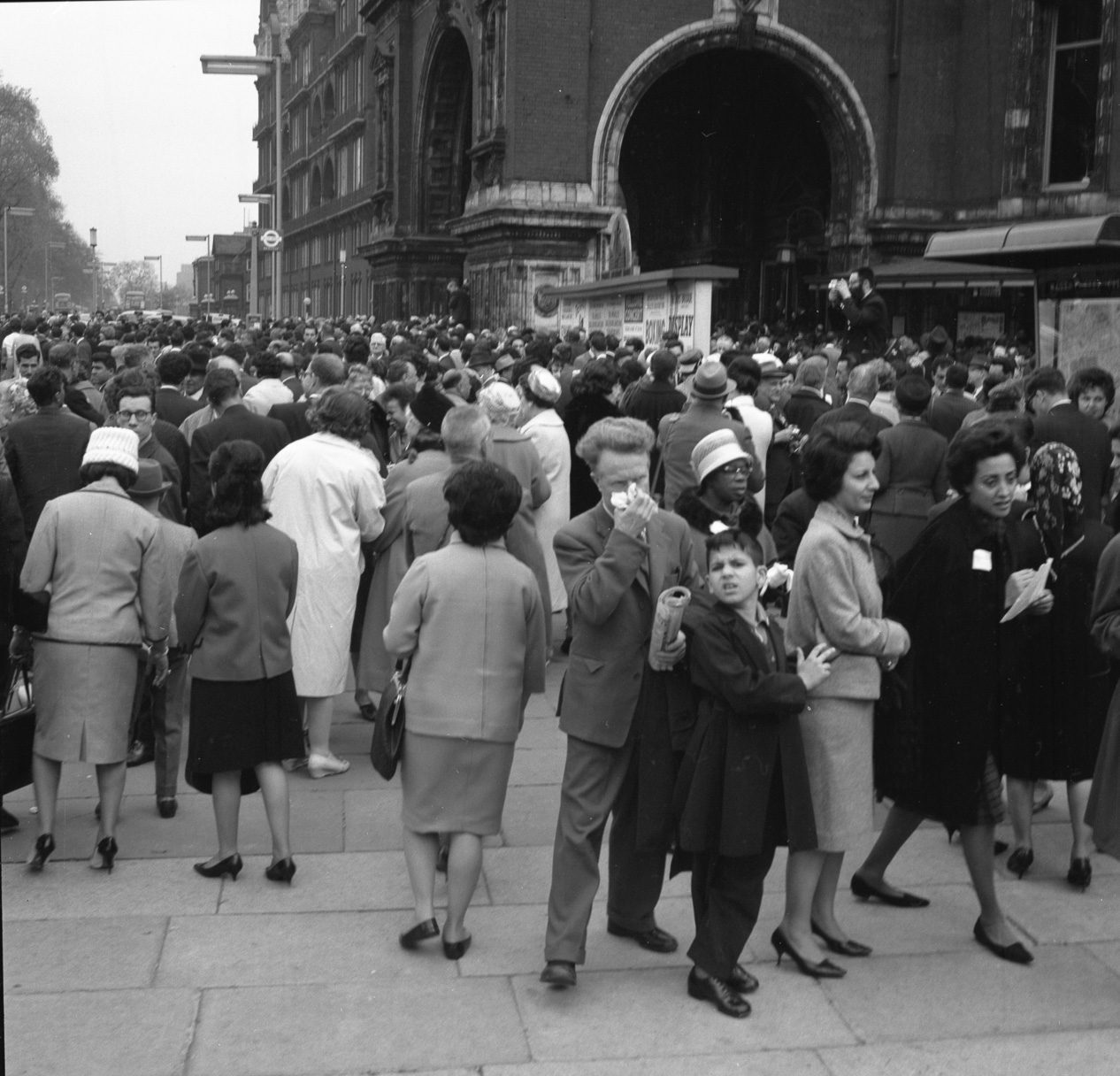
Greetings of love were exchanged a million times, and quiet joy lighted a myriad faces as Bahá’ís poured into the Albert Hall like a sea that found inlets into a hidden ocean. The hall was packed from bottom to top. The air was so charged with love, so pent-up with emotion. They were amazed at the Royal Albert Hall. Leong Tat Chee says, “When I first entered the Royal Albert Hall, I found myself completely awed by the majestic structure of the building. I couldn’t help wondering when the hall was built. Could it have been about 100 years ago? Could God have inspired Queen Victoria to build this Hall, for this crowning victory? Every one of us who was beneath that dome on that unique and historical occasion, could understand in a new dimension, the meaning of the “Oneness of God, the Oneness of Religion and the Oneness of Mankind.”
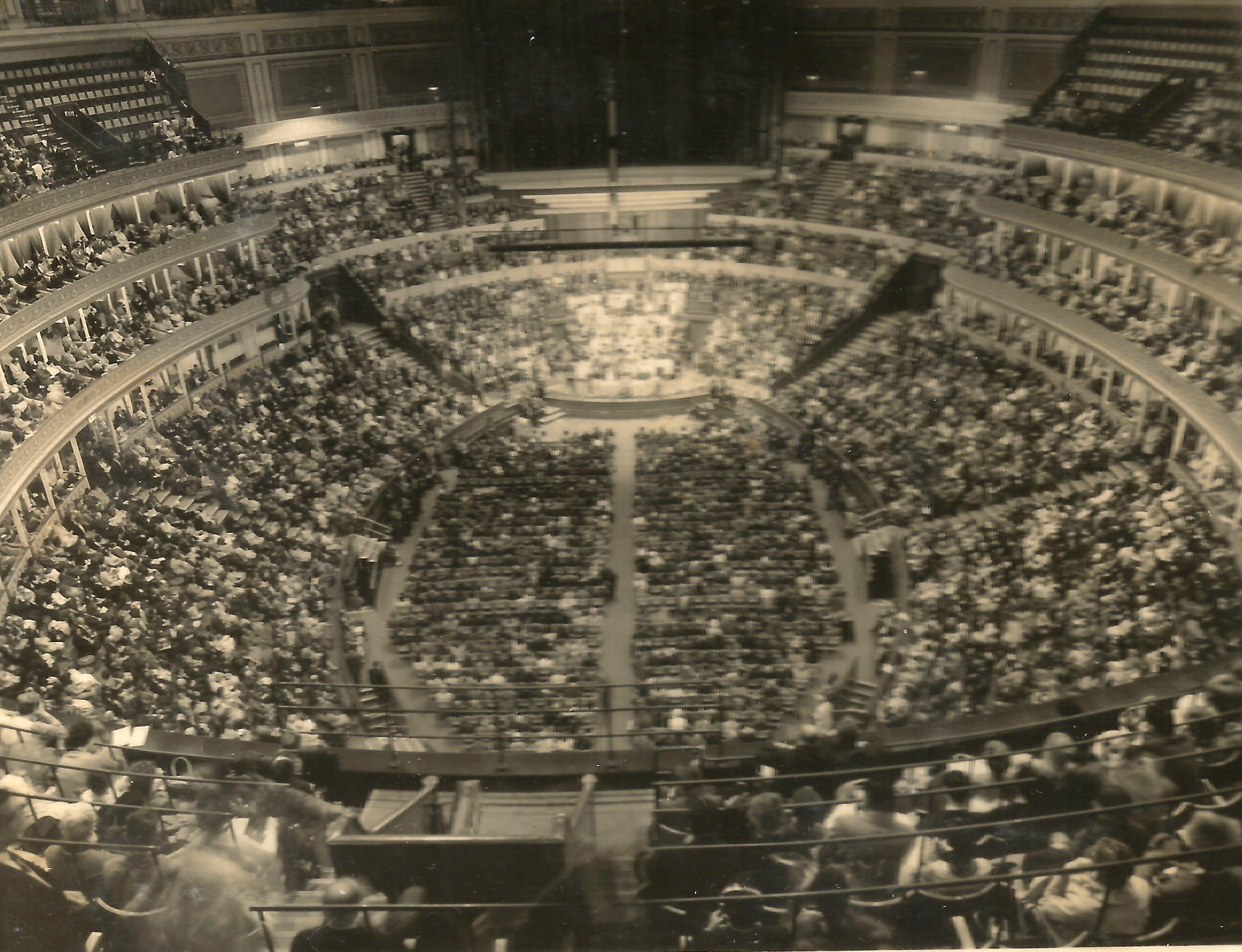
Inside the Royal Albert Hall – electrifying atmosphere. (Photo Courtesy: Margaret Bluett)
CONGRESS SESSIONS
Once inside the Royal Albert Hall, all their eyes were looking all over the hall, to see if they could spot someone known to them. Following the election of the Universal House of Justice in the Holy Land by the fifty-six National Assemblies, all the members came to the Congress in London. Hand of the Cause of God Enoch Olinga was chosen as the Chairman of the opening session of the Congress. The Congress opened with a prayer of praise and gratitude chanted in the Persian language, which sent spiritual vibrations into the hearts of one and all. There were emotional and moving moments throughout the session, too many to recount – the electrifying talks given by the many Hands of the Cause of God, Tarázu’lláh Samandarí giving his first hand reflection of Bahá’u’lláh, presentation of the members of the first Universal House of Justice, reading of the first message from the first Universal House of Justice, and the presentation of the Knights of Bahá’u’lláh, to name a few. It was a great joy for the Malayan believers to see the Knights of Bahá’u’lláh presented. The hall rang with loud applause as everyone rose to pay respect to these wonderful souls, who had answered the call of the Guardian and went to distant countries to fulfil the Crusade goals. They were the ones who planted the seeds from which little plants sprang up and grew into big trees.
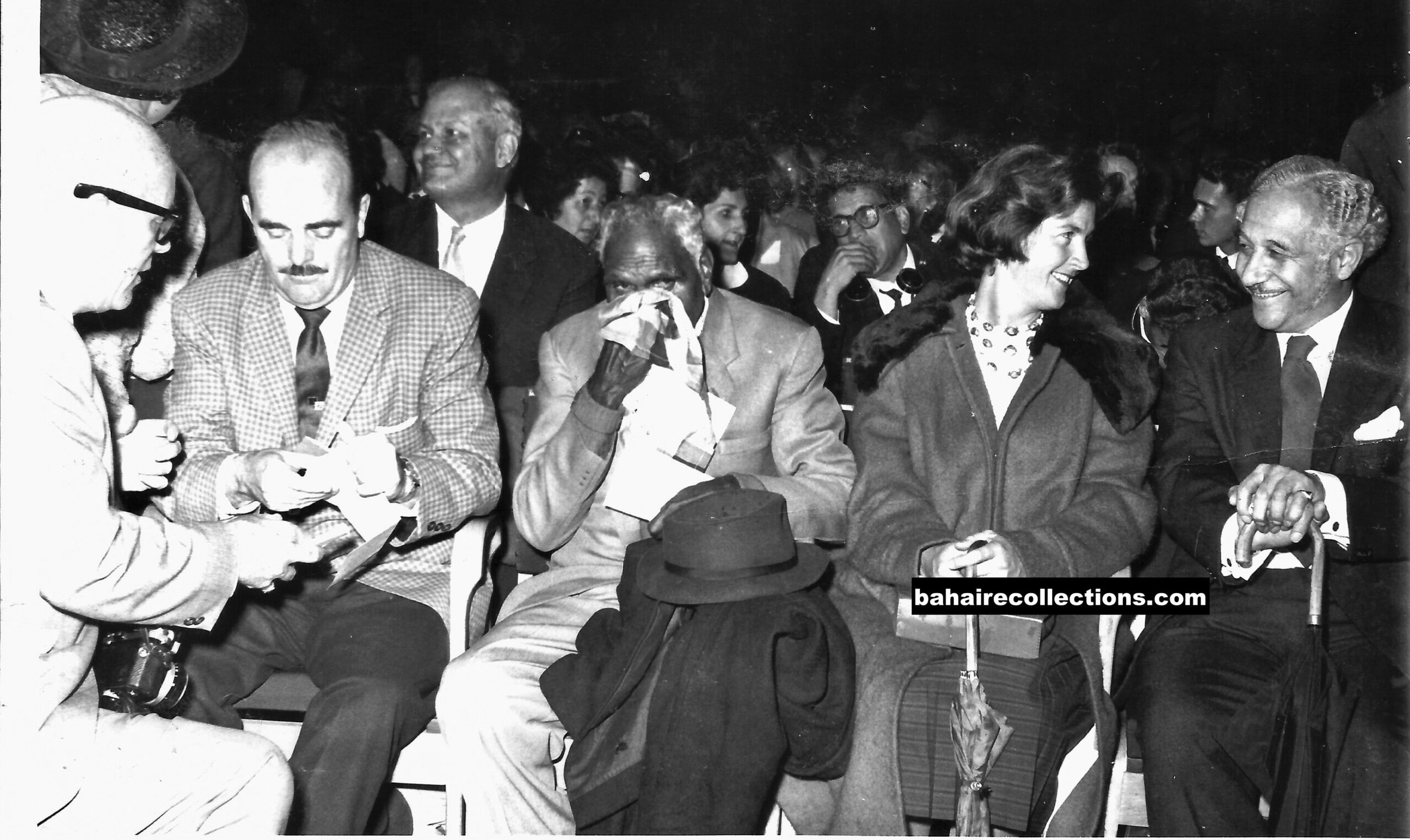
Seated inside the Hall (R-L) Hand of the Cause Hasan Muvaqqar Balyúzí, Margaret Bluett, Australian aboriginal believer Fred Murray, Hand of the Cause William Sears. At the back of Mr. William Sears is Hand of the Cause Alí-Muhammad Varqá. (Photo Courtesy: Margaret Bluett)
The last talk, lasting for hours, was given by Amatu’l-Bahá Rúhíyyih Khánum who spoke on “Shoghi Effendi, The Sign of God”. She paid glowing tribute to him that everyone felt his very presence of the Guardian in the hall. As she recollected the last days of the life of the Guardian she broke into tears. Four African Bahá’ís spontaneously chanted “Allah-u-Abhá” to comfort her. One yet important highlight was the presentation of the members of the first Universal House of Justice.
Hand of the Cause of God Mr. Olinga called upon his fellow Hand, Mr. Paul Haney to introduce the members of the Universal House of Justice. As they came on stage, the 7,000 Bahá’ís present rose spontaneously as a body and welcomed them with a prolonged thunderous applause. The members were: Mr. Charles Walcott (United States), Mr. Alí Nakhjavání (Africa), Mr. H. Borrah Kavelin (United States), Mr. Ian Semple (British Isles), Dr. Lutfu’lláh Hakím (Iran), Mr. David Hofman (United Kingdom), Mr. Hugh Chance (United States), Mr. Amoz Gibson (United States,) and Mr. Hushmand Fatheazam (India). Then Mr. Charles Wolcott read out the first weighty and historical message from the first Universal House of Justice, which the believers knew fully well were words from the Supreme Manifestation of God. There was a pin-drop silence as the 7000 believers listened to every sentence, nay every word. The message itself was so weighty and generated so much spirit in the hall. The clarion call was well registered in the hearts of one and all.
Mr. Leong Tat Chee of Malacca recollected connecting the first international convention with the First World Congress. He was the representative of the Regional Spiritual Assembly of South East Asia at the International Convention and one of the tellers. He said, “In the Tablet of Carmel, God has promised mankind that erelong He will sail His crimson Ark on Mount Carmel. On Riḍván 1963, on Mount Carmel, the members of the First Universal House of Justice were solemnly and reverently elected by members of 56 National Spiritual Assemblies.”
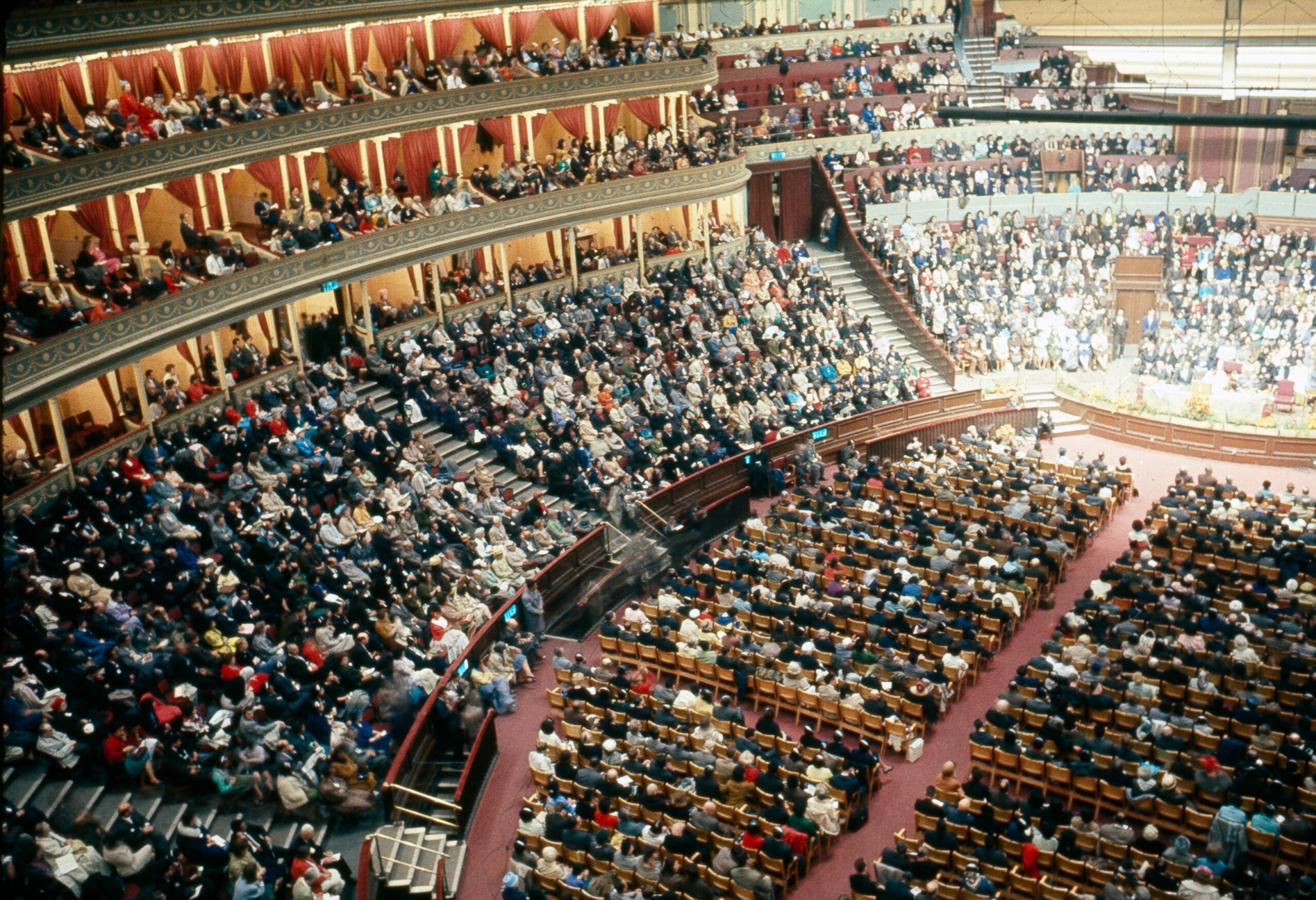
Inside the Royal Albert Hall. Copyright @ Bahá’í International Community.
MALAYAN BELIEVERS
The Malayan believers were also on the program. The Guardian had wanted representatives of all the races to be present at the First Bahá’í World Congress. Therefore, in a meeting of the International Bahá’í Council held on 28 June 1961, a recommendation was made to enable the attendance of at least one representative from each territory and ethnic group opened to the Faith. Leong Tat Chee was selected to represent the world’s seven hundred million Chinese. Deraoh bin Leman, an aboriginal believer from Perak, was the representative of the aborigines of Malaya.
When Leong Tat Chee was invited to say a few words, he stood up, greeted the Congress and sketched the progress of the Faith in Malaya. He commented that “… most of the believers in Malaya are between the ages of eighteen and twenty-five, and their enthusiasm and steadfastness pushed older people like me to go forward and do more for the Cause, and they long for the day when they can participate in spreading the Faith throughout China.”
Deraoh was asked to speak on behalf of his people. He stepped on to the stage with no fear of the crowd. Looking at the sea of faces around him, he spoke in simple Malay for about ten minutes on how he became a Bahá’í, why he became a Bahá’í and what the Faith meant to him. K. Payman, pioneer and member of the Regional Spiritual Assembly of South East Asia from Indonesia who knew the Indonesian Malay, which was close to the Malay spoken in Malaya, translated the talk of Deraoh into English, which, as in all other talks, was simultaneously translated into German, Spanish, French and Persian languages by means of headphones, in a typical United Nations style. The Congress participants were given portable receivers, and they tuned to the language of their choice. That was the biggest gathering in the world to use this system and the entire communication was carried out by the Bahá’ís themselves. He was the only one to be called at different sessions to say prayer in the Malay language. He was so popular that believers flocked around him and shook hands with him or hugged him with Alláh-u-Abhá greetings.
Sathiawan Singh was the only believer from the Sikh background in the whole Congress. When Amatu’l-Bahá visited Malaya in 1961, Sathiawan Singh had indicated to her that he wanted to remove his turban, cut his hair, and shave off his beard. Amatu’l-Bahá had advised him to come to the World Congress the way he was to project himself as a Bahá’í from the Sikh background. Amatu’l-Bahá asked him to consider removing the turban only after his return from the Congress. Sathiawan Singh kept that advice in mind and when he went to the World Congress, he was still wearing a turban and became a center of attraction!
OUTSIDE THE HALL
Activities went on outside the Congress Hall too. There were many children at the Congress premises, and only those above the age of 10 were allowed into the hall. About 150 children below that age limit were placed in a nearby nursery. The Bahá’ís were busy giving the message to the bus drivers, taxi drivers, restaurant workers and the hotel staff. The area near the Albert Hall became a teaching field. Some did accept the Faith. , more than 200 coach loads of Bahá’ís went from the Albert Hall to the Guardian’s resting place at the Christian Cemetery in Arnoz Grove, London.
At the peripherals of the Congress, many interesting gatherings and activities were taking place. There were many children at the Congress. Children under the age of ten were not allowed into the hall. The Malayan delegation was very happy to have met the members of the Universal House of Justice, the Hands of the Cause of God, Knights of Bahá’u’lláh, pioneers, and believers from several parts of the globe. Miss Jeanne Frankel, and her mother Mrs. Kelly Bates, Knights of Bahá’u’lláh to Nicobar was happy to meet her spiritual children from Penang and Malacca. The Malayan delegates managed to also spot some other visitors who had come to Malaya before the Congress, such as Major Harry Charles and Bill Smits.
Already, the Malayan believers had met some Hands of the Cause of God who visited Malaya, especially Singapore, at the Inter-Continental Conference held in Singapore in September 1958 – Mr. Leroy C. Ioas, Mr. Tarázu’lláh Samandarí, Mr. Abu’l-Qásim Faizi, Mr. Harold Collis Featherstone, Dr. Raḥmatu’lláh Muhájir, Miss Agnes Baldwin Alexander, Mr. Shu’á’u’lláh `Alá’í, Dr. `Alí-Muhammad Varqá and Mr. Enoch Olinga. Moved by the impact they had created when coming to Singapore, the Malayan participants were longing to meet them and, as well as many other Hands they had never met before. But it was not possible to meet all of them in that ocean-like crowd. But only a few were able to meet the Hands of the Cause of God. Amatu’l-Bahá Rúhíyyih Khánum, who was deeply impressed by the tremendous growth of the Cause in South East Asia, requested Jamshed Fozdar to round up the key workers from the region. Miraculously and very ably, he managed to gather some thirty believers from the ocean of the crowd while Amatu’l-Bahá invited Hand of the Cause Dr. Muhájir. At this gathering they discussed the next course of heightened activities and plans for this promising region.
And the London police handling the traffic at the Congress venue were wondering what was going on among the new race of men. The police had to move the Bahá’ís out of the road to ease the flow of traffic. The whole area was filled with thousands of Bahá’ís. The police, the bus drivers, taxi drivers and guests in the hotels heard some new kind of greetings never heard before being exchanged among the believers – “Allah-u-Abhá”. Greetings of Allah-u Abhá could be heard all over London that week on buses, in the tube, in every hotel where the Bahá’ís stayed and in the streets whenever they met. Some hotel guests entered into conversation with the Bahá’ís and became Bahá’ís.
The hungry Malayan delegation, having been accustomed to the Asian food, were dying to get some kind of local cuisine. The easiest food was cold meat pies. Luck came when, one evening, they discovered an Indian restaurant by accident. What a relief! Eating rice with curry gave them great satisfaction.
A news station in the United Kingdom held an interview with Bahá’ís on May 2, 1963, mainly near the resting place of Shoghi Effendi in North London. Among the interviewees were Hands of the Cause of God Hasan M. Balyuzi and Collis Featherstone. The local newspapers were quick to cash in on the situation. The Evening Post sold hundreds of copies that reported the Bahá’í Congress events under the heading of “Bahá’í Centenary Congress” on its front page, with many photos. Many Bahá’ís bought their copies for remembrance. There were also other news-stands selling World Congress souvenir editions. Leong Ho San observed, “There was so much news coverage virtually non-stop. The morning and evening editions highlighted much of what took place, at bus stops and cafes and restaurants, and even the hotels where the Bahá’ís were staying in London.”
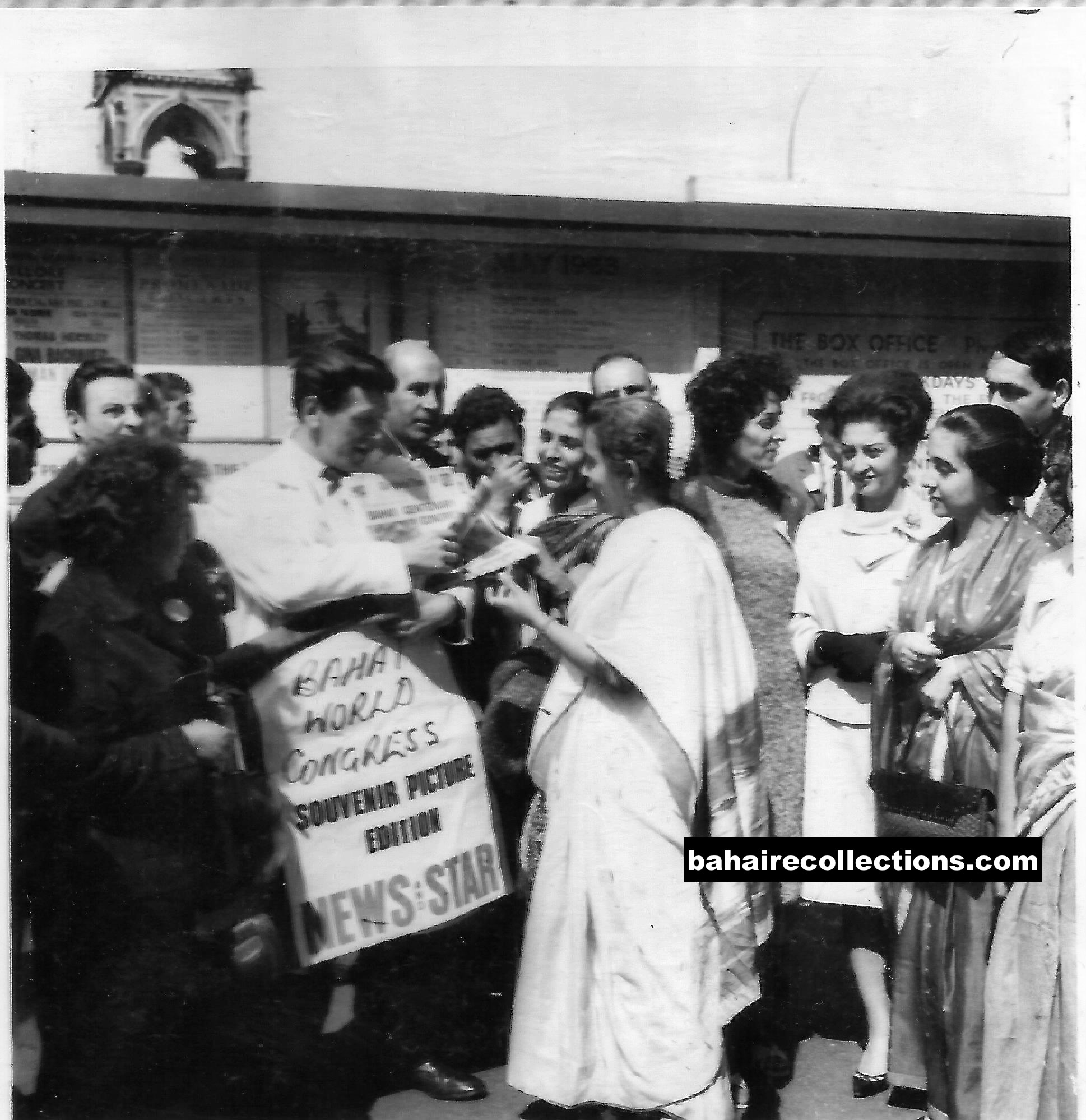
Believers rushing to buy the Bahá’í World Congress Souvenir copies from news vendors.
As the Bahá’ís from Malaysia were not moving in groups, it became impossible for all to come together to have a full group photograph taken. Therefore, photos were taken only among small groups when they had the chance to be together.
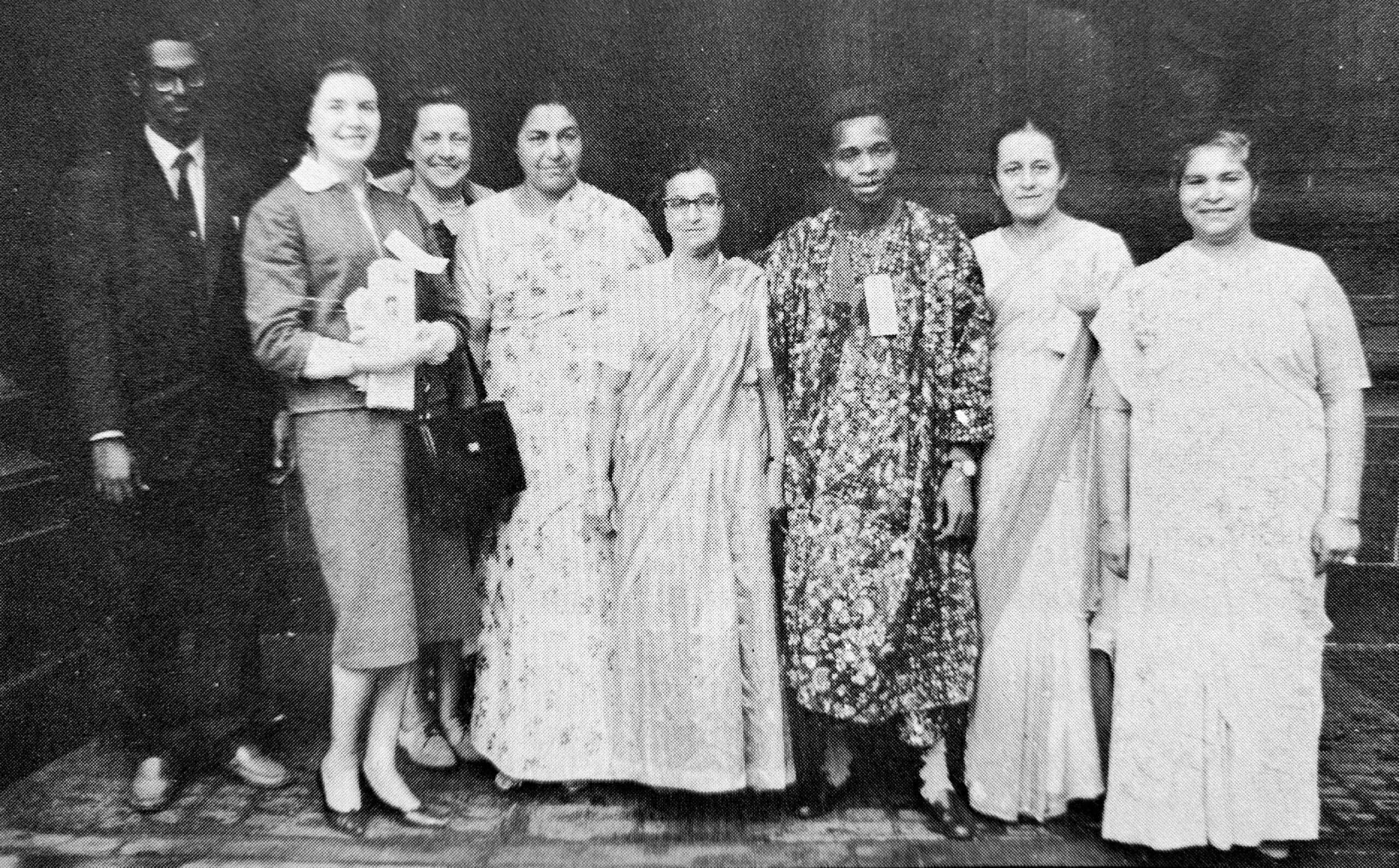
S. Bhaskaran at the extreme left, with some participants from some parts of the world.
Some Malayan believers managed to snap a quick group photo.
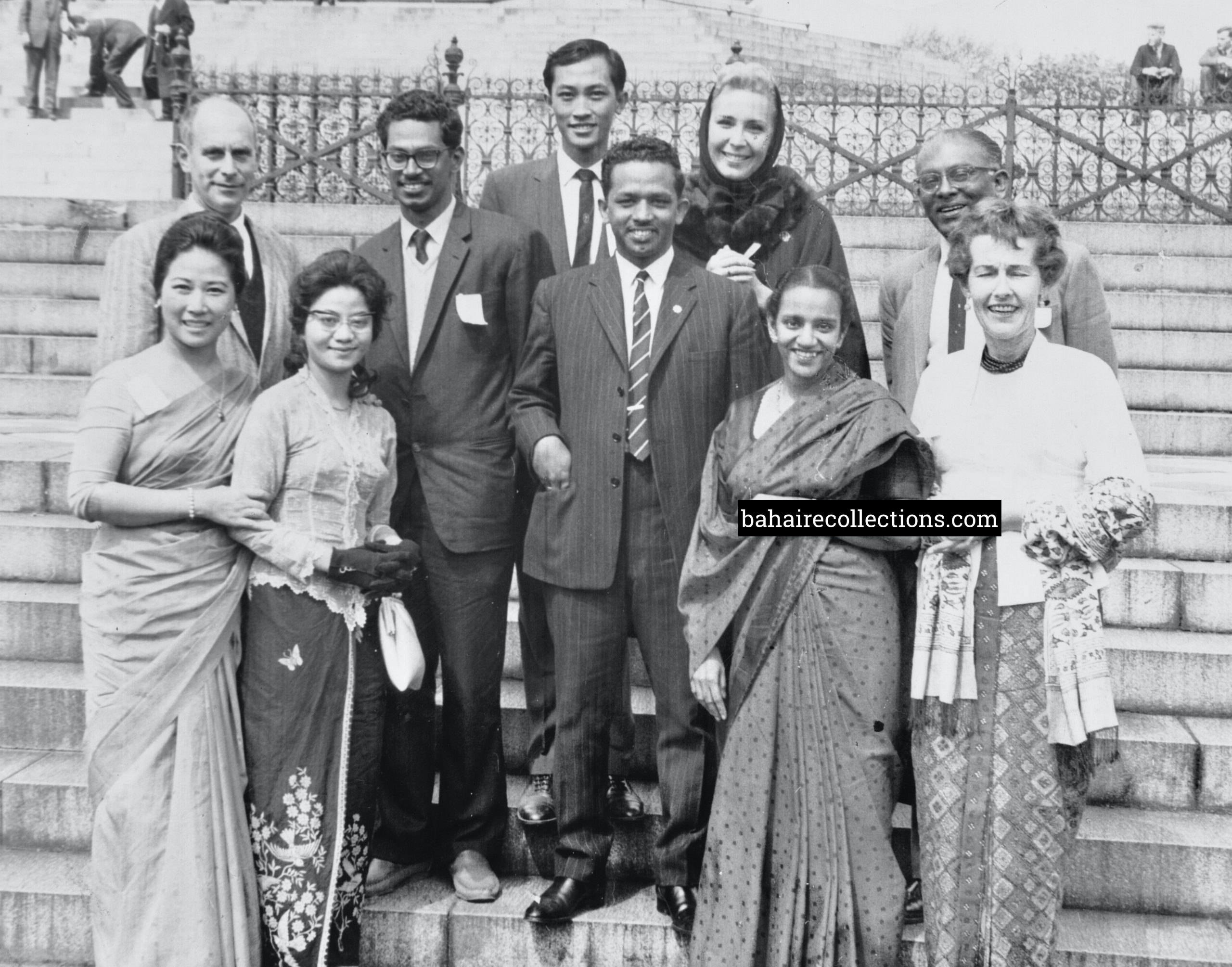
Group photo opposite the Albert Hall. Back row L-R: Dr. R. J. Wolff, S. Bhaskaran, Leong Ho San, Tony Fernandez, Jeanne Frankel and Appu Raman. Front row L-R: Lily Chinniah, Chaing Kim Lin, Shantha Sundram and Elinor Wolff.
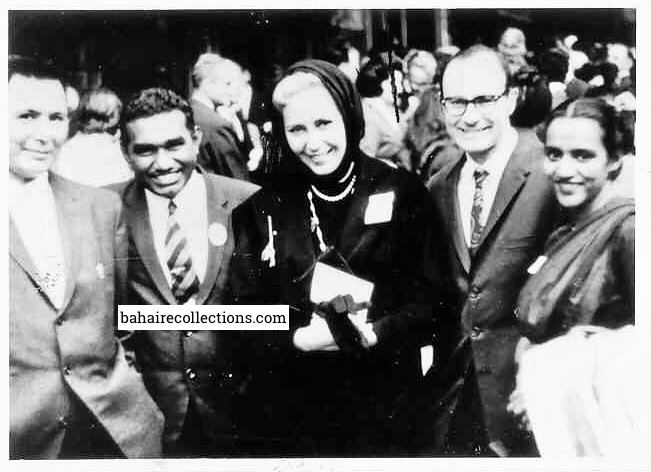
Outside the Albert Hall. R-L; Shantha Sundram, Bill Smits, Jeanne Frankel, Raymond Peter and another participant.
The Congress served as a great inspiration to the Bahá’ís of Malaya, as they were totally convinced that the Bahá’í Faith claiming to bring unity of mankind was no longer a poet’s dream, neither an utopia. They believed it as reality. For the first time, they were able to see many people from different ethnic backgrounds, various levels of education and diverse cultural groups flocking together like members of one family. For the first time, they saw people who were total strangers showing genuine and sincere love for each other, like members of the same family. The whole atmosphere with 7,000 Bahá’ís was truly electrifying.
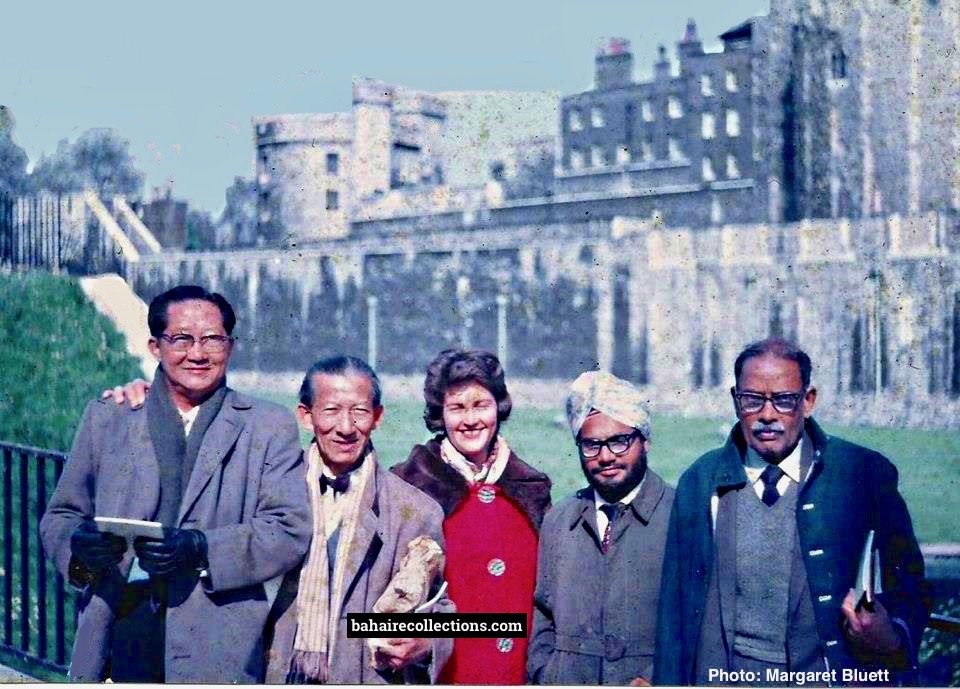
Near the London Tower after the Congress. L-R: Leong Tat Chee, Yankee Leong, Margaret Bluett, Sathiawan Singh and K. Rajah.
SOME RECOLLECTIONS AND REFLECTIONS
The National Teaching Committee had appointed Shantha Sundram as the Publicity Officer for the Malayan group. Her report appeared in the Bahá’í News magazine of the Regional Spiritual Assembly for South East Asia for the month of November 1963. The Congress meant different things to different participants, and some of their feelings have been captured in that edition.
Miss Chiang Kim Lin of Malacca recollected, “We were full of excitement about this great opportunity. It was a great and exciting atmosphere, never experienced before and, doubtful if a repetition would occur again during my lifetime. We felt sad that the Congress was coming to an end. It was a very valuable and exalted power that we felt. We had to leave England with sadness but with unforgettable memories which we now understand as a crowning accomplishment of every Bahá’í and the institution of this glorious Cause!”
Mrs. Lily Chinniah of Jasin said, “It is really quite impossible to put into words the feelings that enveloped me throughout the duration of the Congress, as every minute of the daily program was charged with emotion. How wonderfully thrilling it was to see Bahá’ís of all races, colours, and creeds, hugging and kissing each other with genuine love and affection. The bounty and privilege of being able to be present at the Congress was something that I felt I did not deserve… The Teachings and principles of Bahá’u’lláh, which were only a theory to me, have now become more than a reality. Every minute of the day was precious; so precious that I had to tear myself away during the interval between my meals. Even then, I was drawn like a magnet to the other Bahá’ís to make friends with them or simply to exchange a few words of loving greeting. Spiritual food, it seemed to me, was sufficient to sustain a person in that environment. Never for a moment did I feel I was a stranger among so many new people. I felt so completely at home and in love with all my fellow believers. The first and the only time I was sad was when we had to leave so many new friends. I discovered by speaking to others that I was not alone in this sadness. The day after the Congress, I went back for the last time to have a look at the Albert Hall. It was as quiet and dead as a tombstone. Indeed, the light of Bahá’u’lláh had gone out of the place, and now was abiding in the heart of each believer, where I am sure it will burn brighter than before, as each works harder for the beloved Cause.”
Mr. Tushar Kanti-Paul, the first youth to accept the Faith in Malaya and the first home front pioneer described the Congress, “When we sat together at the Congress, we felt like a huge happy and loving family gathered to partake of spiritual food, all sharing in the glorious victories of the Bahá’í Faith in in every land and every corner of the earth. Once in the hall, we found a living paradise before us! The hall was full to capacity with eager people awaiting the opening prayer. We all felt as if the Earth stood still for a few minutes because of a soul-inspiring prayer chanted in Persian. The effect of that prayer remained with us throughout the rest of the session, which was filled with loving speeches and messages. Bahá’ís from different corners of the earth, read Bahá’u’lláh’s beautiful prayers in many different languages, at the beginning and end of each session…..The whole Congress was like an adventure in love and fellowship. Everyday new faces and voices were seen and heard; everyday new friends were made. And strangely, we all felt so close to each other although we hailed from different corners of the earth. Though we are now parted once again, we shall always remain together in spirit, helping and guiding each other with our wishes and prayers.”
Mr. K. Rajah of Seremban commented, “It was a unique gathering… a miracle without parallel. The meeting commenced with a prayer under the Chairmanship of Hand of the Cause Enoch Olinga. There were different speakers at every session, and each spoke about different aspects of the Faith, some of their experiences in teaching and their achievements in the Crusade, and others of their initial setbacks and latent successes, and still others about the driving power of the Guardian, the architect of the Ten Year Crusade. The aborigines present were individually introduced to the meeting and each one of them spoke in praise of the Faith and the benefits his community had derived by accepting Bahá’u’lláh.”
Miss Koh Ai Lin of Malacca said, “What moved me most was the way thousands of Bahá’ís behaved like one big family talking and laughing and hugging and kissing one another, as though we had just met again after a long separation. Language was a problem, of course, but the greetings of Allah-u-Abhá broke all barriers and united us in love. The happiest moment for me was when the members of the Universal House of Justice were presented. Then came the day when I visited the Guardian’s grave. It was a very solemn occasion. Everybody said prayers, and the Persians chanted theirs so beautifully. The grave was filled with flowers to take away. We prayed for the ones who couldn’t be with us, and we prayed with tears for the unfortunate Bahá’ís in the prison in Morocco.”
Mr. Pijush Kanti Paul of Malacca reminisced, “I was greatly impressed by the bright costumes worn by some of the Bahá’í men and women. There were Africans, Bolivians, Japanese, Chinese, Malayans, Koreans, Latin Americans, Red Indians, Alaskans, Egyptians, Turks, Norwegians, Italians, Portuguese, Spanish, Indonesians, and others, to say nothing of hundreds of Persians and Americans. What a garden of Bahá’u’lláh! Such colourful costumes and interesting head dresses of all types and sizes that looked like fancy flowers blooming in the garden. At the opening session of the Congress, Rúhíyyih Khánum, divinely dressed in white, stood on the platform facing her big family from all over the globe, and her face lighted up with joy and pride as she spoke of the destiny of the Bahá’ís. There were many speakers throughout the Congress, and each was excellent in his own way, but Rúhíyyih Khánum captured the heart of every single person present in that hall, when she spoke on the closing day. For almost three hours, she stood there like an angel, with a beam of light shining continually from her. Every word touched my heart. If one wanted the feeling of spiritual vibrations, one should have been at this Congress.”
Mr. Sathiawan Singh of Malacca recalled, “Two occasions that stand out in my mind as I look back on the Congress, are the times when I was overcome with emotion and wept. There were three Bahá’ís in prison in Morocco, condemned to death for believing in Bahá’u’lláh. The wife and two small sons, one of them, were present at the Congress. A tape recording of the voices of the prisoners was played, and then the wife who was there, spoke very eloquently of the courage of these men. She said a prayer and asked all the Bahá’ís to pray for them too. The youngest son of Fu’ad Tahhan, a Moroccan believer under death sentence, recited a prayer in Arabic from the platform of the Congress. That prayer by that son, barely three years of age, pierced my own soul. A few moments of silence followed as heads were bowed. And hearts joined in loving sympathy. Then one of the children, a little boy of about three, recited a prayer in a clear childish voice that rang through the hall, and Bahá’ís all around were weeping openly. The other occasion was when our beloved Amatu’l-Bahá broke down as she recalled the last few days of the Guardian. The African Bahá’ís filled the silence with a beautiful soft rendering of “Alláh-u-Abhá”, the song that had moved everyone in the hall when it had first been sung at another session. What greater word could have filled the hall at that precious moment. I was completely carried away and so was everyone else in that vast gathering.”
Mr. Yankee Leong had this to say, “ I went with some of the Malayans on a tour of Europe before the Conference. We had the pleasure of meeting so many different people in different countries, and everywhere we went we gave the Message, and we distributed dozens of pamphlets that we took with us. The interest shown in the Faith was tremendous, and after the Congress in London when the 7,000 Bahá’ís returned to their respective countries, I’m sure that they will find every receptive listener. The spiritual force released by the Congress was powerful, and all of us should resolve to use this inspiration and rise to serve the Cause.”
Mr. Leong Ho San of Malacca recalled, “The Congress ended after those fleeting days and we finally and sadly returned home. Now that I am back home, I can hardly believe it all happened. In fact, I am not sure that I remember exactly what happened during that magical week in London. One moment I was myself, and the next moment I was part of a huge crowd. Nothing seemed real anymore. Friends were exchanging kisses and greetings, one felt a looseness of spirit with people who were utter strangers, and yet there were no strangers there, only Bahá’ís from everywhere, all happy, all excited. I wish you were there to share this wonderful experience of being in a different world. I felt so humbled, that in the short time I have been a Bahá’í , I have been given the great bounty of being present at this Congress. Many of the friends who went had hoped to find answers to whatever they were looking for, and hearing from them afterwards, I knew they had found them. Of all the thousands who were present at that historic Congress, only a handful had the privilege of addressing the Congress. Apart from the few selected persons who were the speakers for each session, the others with this special privilege were the representatives of the new races enrolled under the banner of Bahá’u’lláh. Life wasn’t quite the same anymore, the Congress had propelled us to new heights of teaching and service, of renewed dedication and faith, as we, in days and years afterwards, found ourselves becoming world citizens and followers of the Faith of Bahá’u’lláh!”
Mrs. Elinor Wolff recalled, “What did we really expect from the Congress? I don’t know, perhaps miracles. That we had those 7,000 or so Bahá’ís was a miracle in itself. The Cause that had seemed so obscure when I first heard of it is over. Now under this dome of Albert Hall the multitude, races of mankind were gathering to a new ennobling unity under the all- embracing arm of Bahá’u’lláh. The language babble and barrier, and differing cultures and the strangeness just melted away in His transforming love. The tempo of the Congress changed as we came into the time of the Crusade, and the spread of the Faith in the world was reviewed. After years of small groups and small meetings and small communities, there are suddenly so many Bahá’ís. The most outstanding point of the Congress for me was the last speech given by Amatu’l-Bahá Rúhíyyih Khánum. It seemed fitting, somehow this talk was on the Guardian as this was his Congress. His spirit was with us as we closed the last teaching plan he had guided and celebrated the worldwide establishment of the Cause which he had brought about by his effort. This last talk, open, forceful, and long, was the greatest event of the meeting because Rúhíyyih Khánum gave us the Guardian. All his human life, this was the thing he avoided in his self-effacing manner. Now she told of it. The things we had been asking, the things we want to know in this period of half- light understanding of the Guardianship and the Faith. It was a great giving of her gift to us. She told of the austere life he led, and the long hours spent at writing, thinking ,planning, sleeping little, and always working for the Faith. He was the greatest man of our times, unrecognized yet by the world, known only to Bahá’ís.”
Such were some of the recollections of some participants. What they all had clearly witnessed was the evaporation of all kinds of man-made prejudices at the gathering in London- be it cast, colour, creed or race. One elderly lady from another part of the world approached a bachelor believer from Malaya and asked if he would like to get married to her daughter- without even knowing the background of that Malayan believer. The believer simply said he was not ready for marriage. But that proposal sent home a clear message – the Faith has the tremendous power to melt away all man-made barriers! And there were many unmarried people who were exchanging addresses. The Bahá’ís of Malaya came back with a new zeal and strong determination to work ever harder to advance the interests of the Faith.
PUBLICITY IN MALAYA
Many Malayan Bahá’ís who had no chance of going to the Congress came to know the full details only days later when the participants returned and related the events. But on 2 May 1963, while the Congress was still in session in London, the Straits Times of Malaya dated 2 May 1963 reported the event under the heading of “World’s Bahá’ís Meet-Centenary of Founding of The Faith”, accompanied by photographs.
LOCAL CELEBRATIONS
Around the same time the Congress was in session in London, the Centennial Celebrations of the Most Great Jubilee also took place in selected communities in Malaya.
Seremban
The Bahá’ís of Seremban attracted much publicity when they celebrated the event. Posters and banner advertisements were freely used throughout the town and slides were shown at the cinema theatres. Invitations were sent to all heads of government departments, religious leaders, heads of schools as well as. Neighboring Local Spiritual Assemblies, friends and contacts to attend the Grand Tea Party at the Town Hall on 1 May 1963. The guest speaker was S. Vasudevan from Malacca, who presented a comprehensive outline of the Faith, while Mr. Stephen D. Manoharan made a short translation of Vasudevan’s talk and Mr. Ramasamy gave a short talk about the Faith. The program also included a beautiful chart and a book display. Mr. Poh Eng Siew of the Local Spiritual Assembly of Seremban presided at the meeting. The meeting that started at 5:30 pm ended at 8:30 pm amidst a happy and glorious atmosphere. More than 300 invitations were sent out and 2000 pamphlets were distributed throughout the state of Negeri Sembilan.
Alor Star
On 22 April, adult and young members of the community called at the Children’s ward in the Hospital and distributed toys, cakes and fruits to commemorate the Centenary of the Declaration of Bahá’u’lláh. A party was also organized for the community on the following day for the Bahá’í community and some others, which proved a great success. The children readily contributed various items to an impromptu variety show. Prizes were distributed at the end.
Penang
In Penang, the Centenary celebration was marked by entertaining the orphans of the Ramakrishna Mission with a sea-side picnic for a whole day. A chartered bus took the fifty of them to Tanjong Bungah, where a bungalow was rented for the occasion. The children were told who Bahá’u’lláh was and the Bahá’í Faith stands for. A party was also organised the following day for the children of the Bahá’í community and some others, which proved a great success. The children readily contributed various items to an impromptu variety show. Prizes were distributed at the end.
UPON RETURNING TO MALAYA
Their return from London transited in Bahrain and Colombo before touching down in Singapore. Whereas on the way to London, the believers were wondering what would be in store at the Most Great Jubilee, on their return journey they were reflecting on the unbelievably great experiences they had, never to be repeated in their lives. Those were moments of heart-bursting joy. There can be no doubt that they all returned as transformed believers, fully committed to the affairs of the Faith. Leong Tat Chee dug a hole in the veranda of his house and buried a relic he had brought from the Holy Land, consecrating that spot forever for the Faith.
The Malayan believers who did not have the privilege of participating in the London Congress were eagerly waiting for the participants to return to get the first account of the proceedings in London. There was so much air of excitement. The sharing of information and inspiration started from the moment they arrived in the Malayan soil, starting first within the family circles, followed by a few phone conversations at a time when only a few could afford phone installations, and not to forget sharing of photographs. It did not take long before they all started to share in larger gatherings. Mrs. Shantha Sundram presented a report to the community at the Nineteen Day Feast held on 16 May, only to arouse the greatest inspiration among the attendees.
SPECIAL COVERAGE
There was special coverage of the Congress in the Sunday Mail dated 19 May 1963, that featured an interview with Deraoh Leman. The heading was Aborigine Speaks to 7,000 in London. The news read: From a remote aborigine village in Bidor, to the historic Albert Hall in London … that is the success story of 40-year-old Deraoh Leman. For aborigine Leman, the last two weeks in London were the most exciting in his life as he took in the sights of London in between sessions of the Bahá’í centenary world congress. There were many firsts in his life in those two weeks that he had lost count of them… his first plane trip… his first glimpse of London…. His first ride on the Tube, which he insists should be named “Kereta Hantu” because one has to go underground to travel. But all these faded into insignificance when he was picked to speak on behalf of the 35 Bahá’ís who had gone with him to London for the Congress at the Albert Hall. The self- made man took all his stride and as he stood addressing 7,000 Bahá’ís in simple Malay, he was admired by all for his poise and charm. Without any signs of stage fright or nervousness, he stood before the vast audience and told them how he was overwhelmed by the friendliness of the strangers he had met both on his way to London and in London itself. Leman started off as a rubber tapper in his kampong years ago but soon was offered a chance to study. He grabbed the opportunity and in no time earned himself a job as a teacher in the aborigine school in his village. He became a Bahá’í soon after and early this year was selected to be one of the delegates to the Congress. His trip to London in a chartered plane was made possible by all the Bahá’ís in Malaya to whom Leman says a big ‘thank you”. Back at his teaching post, Leman is still wondering whether these last two weeks were a dream…”
AT THE SUMMER SCHOOL
At the Sixth Malayan Summer School held at the Malacca Youth Hostel, Pantai Kundor, Tanjung Kling, from 2 to 5 August 1963, the participants of the London Congress shared their experiences with other participants of the Summer School. Lily, who had just come back from the Most Great Jubilee in London, shared the spirit of that first World Congress with the participants. Lily gave a vivid account of the Congress that greatly inspired the audience.
Sathiawan Singh said to his friends in a jest, “I was the center of attraction at the Congress. Perhaps that was the first time they saw a person with a turban and beard. They were looking at me as though I was something that had escaped from the London Zoo. A policeman kept looking at me and forgot to control the traffic and forgot about himself.” He added further, “On the flight to London I had planned to see many places, and did see great landmark spots, but once inside the Albert Hall, I felt I had seen heaven itself, and everything else I had seen in London paled into insignificance. I had been blessed beyond measure to have witnessed the First World Congress.”
And years later, the God-intoxicated believer Mr. Leong Tat Chee would often remark, with tearful eyes, what a wonderful occasion that was, to see such a special gathering of mankind coming together as one world family. He saw the reality of the unifying teachings of the Faith in action, certainly a fulfilment of his earlier dreams which he held when he was a member of the Swastika Society. For many years to come, the participants would often relate the event of a lifetime. Their parting message to the next generation of believers was always, “You all miss something never to happen again in our history. We were simply privileged to attend what was a once in our lifetime event.”
The First Bahá’í World Congress was certainly a one-time event in the lifetime of mankind. No age had witnessed such momentous happenings.
A. Manisegaran
31 January 2023
Copyright©bahairecollections.com
You may leave your comments at: info@bahairecollections.com